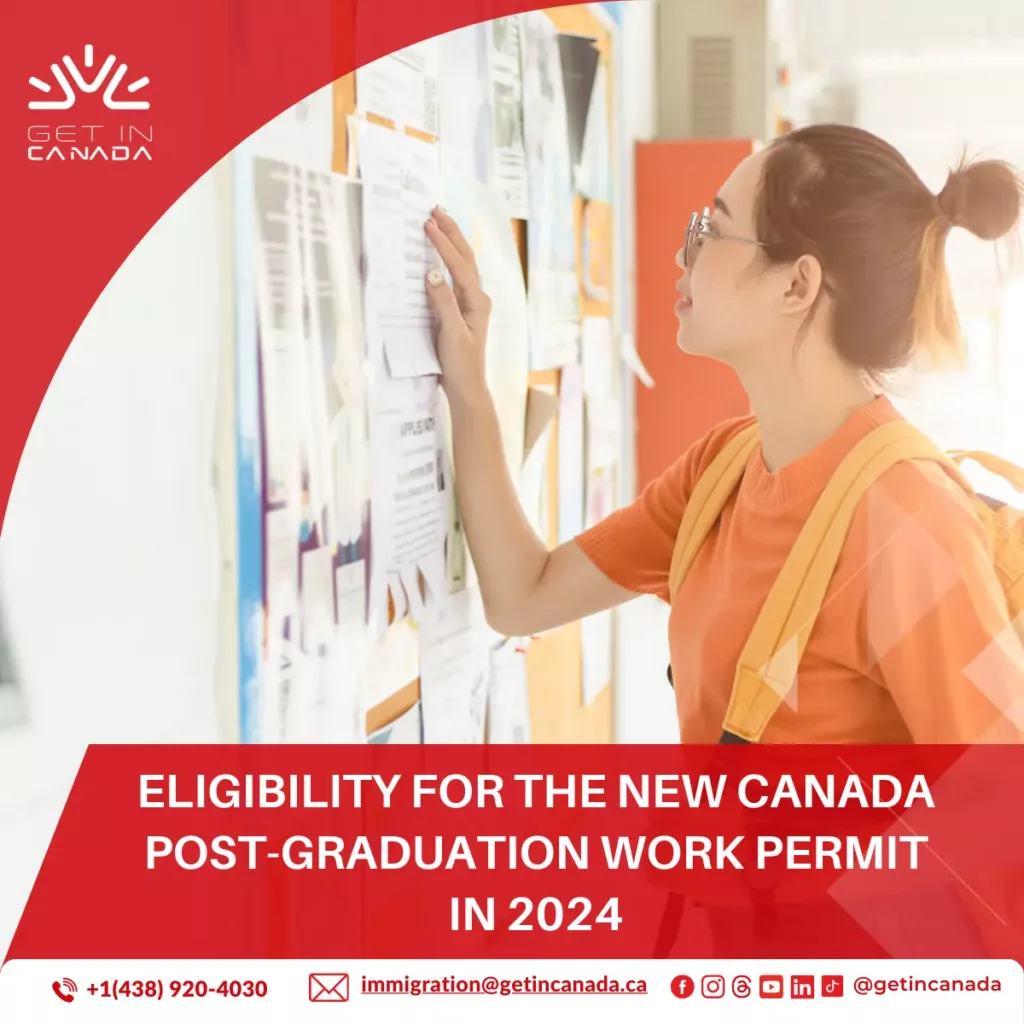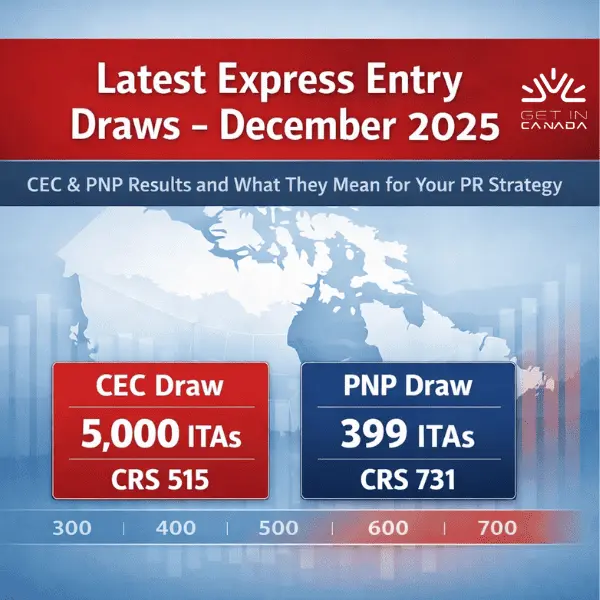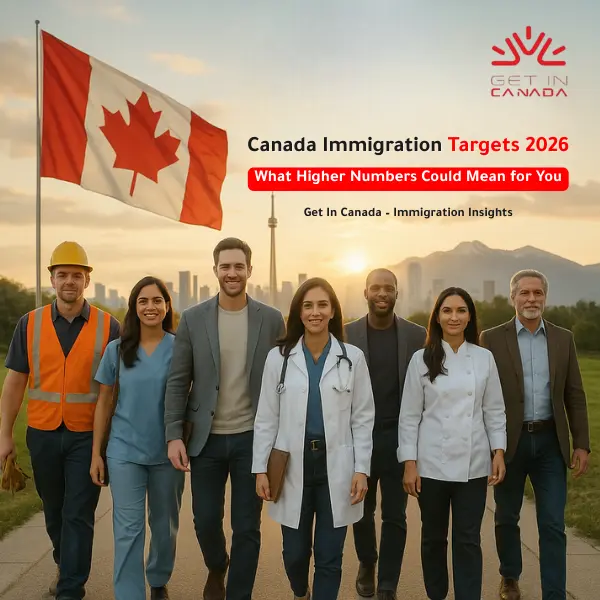Are You Eligible for Canada’s New Post-Graduation Work Permit in 2024?
Are You Eligible for Canada’s New Post-Graduation Work Permit in 2024? We’ll explore together the updated eligibility criteria for the Canada Post-Graduation Work Permit in 2024. It discusses recent changes to the program and their implications for international students seeking post-graduation employment opportunities in Canada. The summary highlights the blog’s focus on guiding readers through the nuances of the revamped PGWP to help them make informed decisions about their career prospects in Canada.

Starting February 15, 2024, significant updates have been introduced to the Canada Post-Graduation Work Permit Program (PGWPP) to enhance opportunities for master’s degree graduates in the Canadian job market. These changes signify a crucial advancement for international students seeking education and employment in Canada.
Enhancements to the Post Graduation Work Permit Program (PGWPP) in 2024
In the following, we’ll discuss the enhancements to the PGWPP:
Extended Eligibility for Master’s Graduates
Under the updated regulations, effective February 15, 2024, students who complete a master’s program, regardless of its duration, qualify for a three-year PGWP.
Facilitating Workforce Integration
The extension of PGWP duration for master’s graduates aims to ease their transition into the Canadian job market, thereby boosting their chances of attaining permanent residence there.
Canada’s commitment to talent attraction
This significant policy shift demonstrates Canada’s dedication to attracting and retaining top global talent, acknowledging the invaluable contributions of master’s degree holders.
Expanding Opportunities for International Students
The evolution of the post-graduate work permit program presents a wealth of possibilities for aspiring international students, providing an extended timeframe to explore career prospects and gain invaluable professional experience in Canada.
Find out if you are eligible to get in Canada →
Changes to PGWP Eligibility for Public-Private Partnership College Programs
To address concerns regarding the quality of education and student support in specific public-private partnership college programs, the IRCC has imposed restrictions on PGWPs for these institutions.
Effective September 1, 2024, students commencing curriculum licensing agreement programs will no longer have access to PGWPs.
While current international students enrolled in these programs remain eligible for PGWPs, new entrants will not qualify for post-graduation work permits.
This regulation aims to ensure students receive a quality education and enhance their prospects for future career success.
Reflection on PGWPP Updates 2024
The revisions to the Post-Graduation Work Permit Program present numerous fresh opportunities for international students aspiring to study and work in Canada.
These modifications contribute positively to Canada’s growth, ensuring the program’s efficacy and simplifying the process for students to secure employment post-graduation.
It is crucial to stay abreast of the updated eligibility criteria to optimize opportunities for academic and professional achievement in Canada.
Revisions to Spousal Open Work Permit Eligibility
Recent adjustments are underway regarding the eligibility criteria for obtaining a work permit for the spouses of international students in Canada.
New Criteria Implementation
In the imminent changes, only partners of students pursuing graduate or professional degrees will be eligible to secure a work permit.
Impact on Partner Eligibility
This signifies that partners of students enrolled in higher-level programs such as master’s or doctorate degrees will continue to qualify for a work permit.
Restrictions for Lower-Level Programs
Conversely, partners of students enrolled in lower-level programs like bachelor’s or college diplomas will have limited eligibility, with the opportunity for a work permit only once.
Objectives of the Update
The rationale behind this Open Work Permit Eligibility Update is to ensure alignment between the student’s level of education and the employment opportunities available to their partner.
Promotion of Fairness and Equal Opportunity
The overarching goal is to promote fairness and provide everyone with equitable chances based on their educational aspirations.
Limiting International Student Intake and PAL Requirements
To regulate the influx of new international students, Canada has introduced a cap on the annual number of authorized study permits, reducing the quota to approximately 360,000 in 2024—a significant 35% decrease from the previous year. Effective January 22, 2024, most new international students enrolling in Canadian colleges or universities are now required to submit a Provincial Attestation Letter (PAL) from the respective province or territory where they intend to study alongside their application.
Purpose of the PAL Requirement
The PAL serves as official documentation, indicating that the student has received approval from the province or territory to pursue studies in Canada. This change is aimed at ensuring the sustainable growth of Canada’s population and fostering the smooth functioning of the immigration system. Prospective students are encouraged to familiarize themselves with the eligibility criteria for obtaining a PAL, as it is essential for simplifying their study permit application process and ensuring compliance with the updated regulations.
Determining Eligibility for the Canada Post Graduation Work Permit (PGWP)
Previous Criteria:
Formerly, graduates from eligible Canadian post-secondary institutions with study programs lasting at least 8 months were eligible for the PGWPP, provided they satisfied all other program requirements.
Recent Reforms:
However, Canada has recently overhauled the PGWPP eligibility criteria. As of September 1, 2024, graduates from public-private partnership college programs will no longer qualify for PGWP if they commence their studies on or after this date.
Duration of the Post-Graduation Work Permit (PGWP)
The duration of the completed study program determines the validity of the Post-Graduation Work Permit (PGWP).
Recent updates to the PGWPP
Changes to the Post-Graduation Work Permit Program (PGWPP) involve prolonging the work permit duration for master’s degree graduates to three years, starting on February 15, 2024. This extension applies regardless of the length of their study program.
Limitations on PGWPP Eligibility
There are potential limitations on eligibility for the Post-Graduation Work Permit Program (PGWPP), affecting graduates of public-private partnership college programs and specific study permit applicants. Additionally, the eligibility of spouses for work permits may be influenced by the level of the student’s program.
In conclusion, this blog has provided valuable insights into the updated eligibility criteria for the Canada Post-Graduation Work Permit in 2024. By exploring recent changes to the program and their implications for international students, you must have gained a deeper understanding of the requirements and considerations involved in obtaining the PGWP. As aspiring graduates navigate their post-graduation journey in Canada, staying informed and prepared to meet the eligibility criteria outlined in the blog is essential. By doing so, students can maximize their opportunities for professional growth and success in the Canadian workforce. As the landscape of post-graduation employment evolves, the blog serves as a valuable resource for guiding students toward a successful transition from academia to the workforce in Canada.











